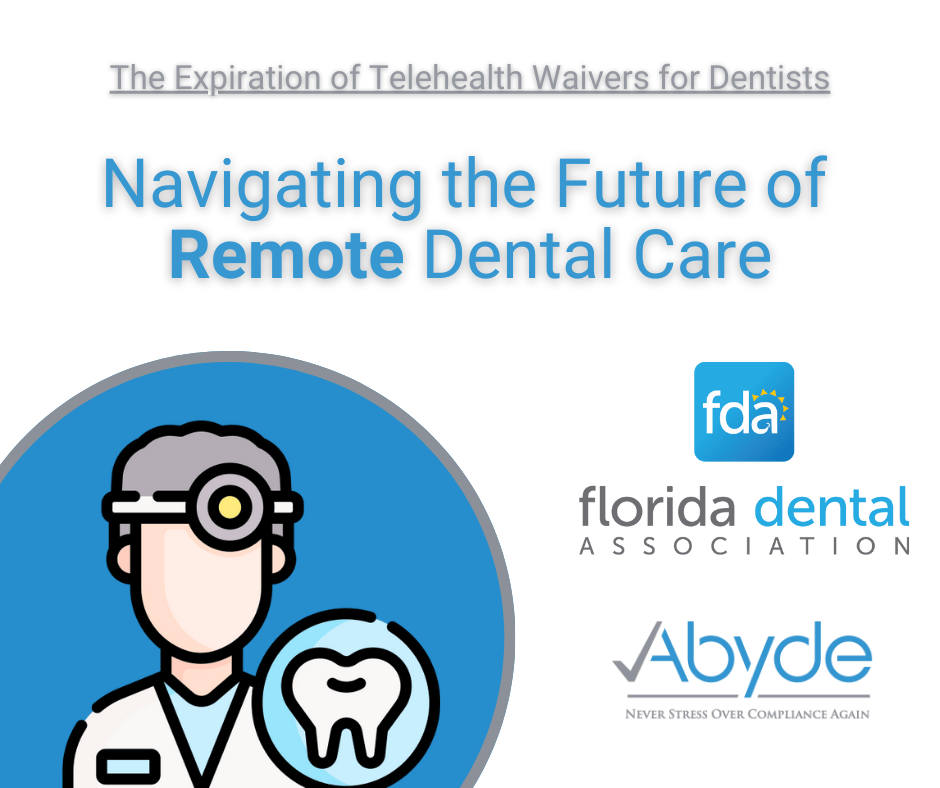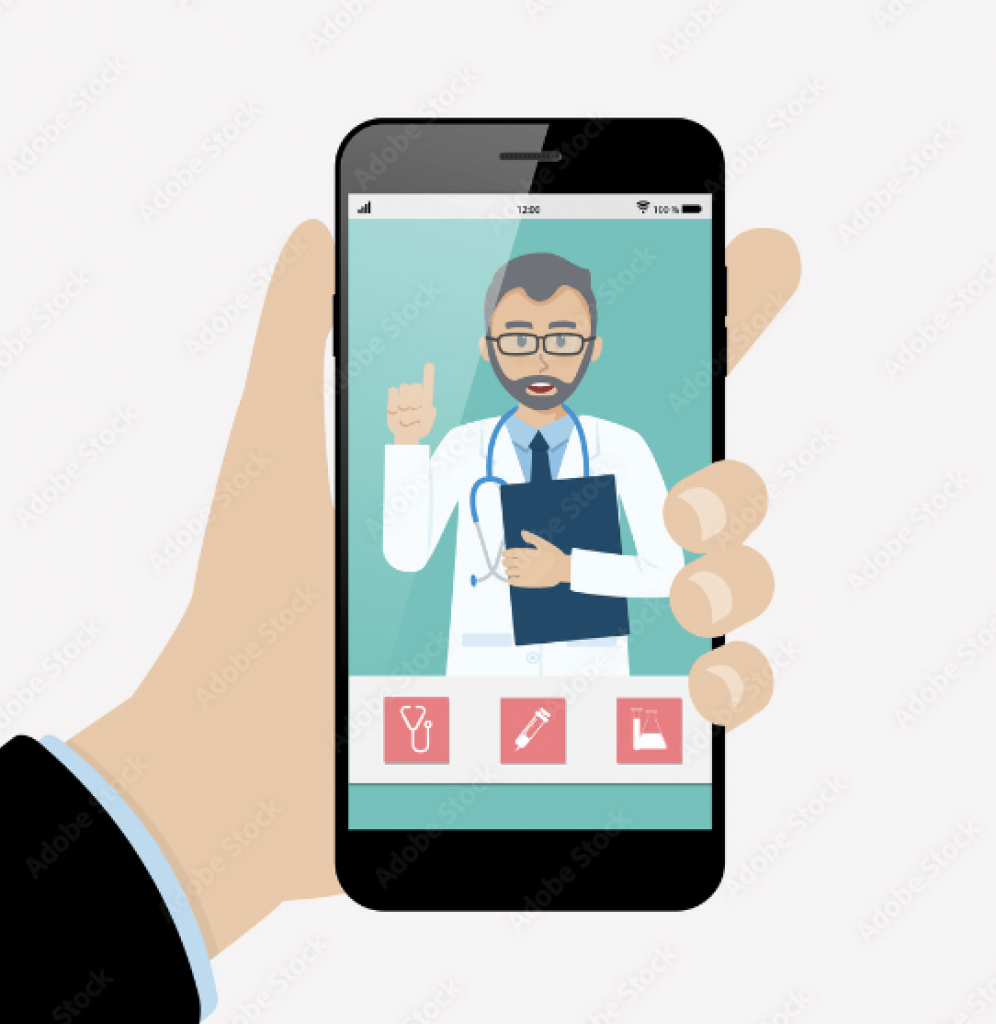May 23, 2023 Over the past couple of years, telehealth has revolutionized the healthcare industry, including dentistry. However, as the COVID-19 pandemic wanes and the healthcare landscape evolves, the telehealth waivers that allowed dentists to provide virtual care through non-compliant platforms are expiring. Let’s explore the implications of these expiring waivers and how dentists can navigate the future of remote dental care. The Rise of Telehealth in Dentistry: Telehealth emerged as a crucial tool during the pandemic, enabling dentists to connect with patients remotely for consultations, follow-ups, and non-emergency care. These waivers expanded access to dental services, particularly for underserved populations, reduced unnecessary in-person visits, and improved overall patient experience. Dentists embraced telehealth to ensure continuity of care while minimizing the risk of virus transmission. Implications of Expiring Waivers:Using platforms like Apple Facetime, Skype, Zoom, and other non-public facing platforms were part of the Notice of Enforcement Discretion the OCR laid out in March of 2020. Now that virtually every EHR/PM solution and other technologies have emerged over the last 3 years, practices can easily implement compliant solutions. Dentistry will always predominantly be an in-person health care service but with the expiration of telehealth waivers, those dentists that found telehealth an important addition to their practice need guidance on which compliant platforms to use. Dentists must evaluate the effectiveness, efficiency, and patient satisfaction associated with virtual care. Additionally, they should consider the legal and regulatory implications of providing telehealth services without waivers and adapt their practices accordingly. Navigating the Future of Dental Care: To navigate the post-waiver landscape, dentists can take several steps. First, staying informed about the evolving guidelines and regulations surrounding telehealth is crucial. • The first step is assessing risks and vulnerabilities through a Security Risk Analysis. This knowledge will help dentists adapt their practices and comply with existing laws. • Second would be to have policies in place to ensure the telehealth services these dentists provide to patients is telling the story of how they are protecting that sensitive patient information. • Finally, investing in technology and software solutions that facilitate secure and efficient virtual consultations can enhance the patient experience and practice efficiency. Conclusion: While the expiration of telehealth waivers poses challenges for dentists, it also presents an opportunity to evaluate and refine the role of telehealth in dental care. By staying informed, embracing hybrid models, and leveraging technology, dentists can continue to provide high-quality care while adapting to the evolving healthcare landscape. Questions regarding HIPAA and OSHA Compliance, please email Abyde at info@abyde.com or call (800) 594-0883
OCR Announces Transition Period for Compliance with HIPAA Rules for Telehealth
April 12, 2023 As of May 12, 2023, a 90-calendar day transition period will be in effect to provide covered healthcare providers with time to come into compliance with the HIPAA Rules in relation to their provision of telehealth. The transition period will expire on August 9, 2023, at 11:59 p.m. During this period, the OCR will continue to exercise its enforcement discretion. It will not impose penalties on covered healthcare providers for noncompliance with the HIPAA Rules that occur in connection with the good faith provision of telehealth. The Notice of Expiration of Certain Notifications of Enforcement Discretion Issued in Response to the COVID-19 Nationwide Public Health Emergency is available at: https://public-inspection.federalregister.gov/2023-07824.pdf – PDF. This notice marks the end of the enforcement discretion period that was put in place by the OCR to support the healthcare sector and the public in responding to the COVID-19 public health emergency. OCR Director Melanie Fontes Rainer has emphasized that the OCR is committed to supporting the use of telehealth by ensuring that healthcare providers can make the necessary changes to their operations privately and securely in compliance with HIPAA Rules. In addition to announcing the transition period, it’s worth noting that the OCR had previously issued four Notifications of Enforcement Discretion in the Federal Register regarding how the HIPAA Rules would be applied to certain violations during the COVID-19 nationwide public health emergency. These notifications and their effective beginning and end dates are: It’s important to note that these notifications will also expire at 11:59 pm on May 11, 2023, due to the expiration of the COVID-19 public health emergency. The OCR will no longer exercise enforcement discretion for violations that occur after this date, which is why the transition period has been put in place to allow covered healthcare providers to make any necessary changes to their operations to ensure they comply with HIPAA Rules when providing telehealth services. Questions regarding HIPAA and OSHA Compliance, please email Abyde at info@abyde.com or call (800) 594-0883
HHS’s Recent HIPAA Guidance on Telehealth and Public Health Emergency Expiration
July 11, 2022 Think you finally got the hang of telehealth? Don’t get too comfy just yet! The OCR recently released guidelines on how covered health care providers and health plans should utilize their remote communication technology to deliver audio-only telehealth services while also complying with HIPAA requirements. Why is Telehealth important? Let’s start at the beginning. Telehealth contributes to increasing a practice’s value and security by expanding access to health care across the nation and providing certain users who have difficulty using audio and video telehealth technologies. When systems are not properly secured, they pose risks to patient safety, health, and data. Cyberattacks and ransomware are extremely common in Telehealth and may quickly create issues that disclose medical information and other sensitive information. As a practice, it is critical and worthwhile to maintain excellent Telehealth especially now a days with the increased funding and resources the OCR has available. OCR Director, Lisa J. Pino, states, “Audio telehealth is an important tool to reach patients in rural communities, individuals with disabilities, and others seeking the convenience of remote options. This guidance explains how the HIPAA Rules permit health care providers and plans to offer audio telehealth while protecting the privacy and security of individuals’ health information.” With the OCR’s Telehealth Notification system possibly being taken down as early as July 15th, 2022, we recommend that practices stay alert and take every precaution by using your friendly, easy to use HIPAA-compliant software (hint Abyde) to assure full compliance today. The first step in remaining alert is to follow the guidance issued by the OCR in response to the recent news that the Telehealth Notification system may be shut down. The guidance below specifies the conditions under which telehealth may be utilized. The HHS is authorizing HIPAA-covered businesses to conduct telehealth and audio-only services using remote communication technology. However, these services must be provided in a private environment to the best of the entity’s abilities, and the individual’s identification must be verified. Even though HIPAA does not apply to audio-only telehealth services delivered through electronic communication methods, when offering telehealth services through mobile devices or applications, practices may face HIPAA compliance issues. Therefore, practices should identify all potential risks and vulnerabilities to PHI confidentiality as part of the risk analysis process prior to the completion of the PHE. Abyde will do anything possible to make sure you’re on top of your compliance game because the OCR may show up at any time! Allow us to guide you through these future changes – from our incredibly simple software to our readily available education, we will be your buddy in ensuring that you are prepared for any obstacles that show up at your door.
Is Your Telehealth Solution HIPAA Compliant?
July 2, 2020 Ever thought you’d be saying “What’s up Doc?” on a video chat from home? Telehealth has made remote visits a new reality – though not all telehealth providers have been created equal when it comes to being HIPAA compliant. Why is it important for telehealth to be compliant? 90% of healthcare executives have already or are planning to adopt telehealth services within their operations, and as remote patient care continues to explode in popularity so do the risks to compromising that patient information. Part of telehealth’s current popularity is due to COVID-19. To best meet the urgency brought on by COVID-19, the Office for Civil Rights (OCR) provided an update to the provision of telehealth services allowing providers to use any form of non-public facing video communications with patients, even if they weren’t considered ‘HIPAA compliant.’ While this enforcement discretion is only temporary, we can predict that the general public will prefer to keep their distance and avoid face-to-face doctor visits if possible for the foreseeable future. In fact, a recent study found that 74% of Americans would be comfortable and willing to use telehealth services for their doctors appointments. While COVID-19 has made a major impact on telehealth services, the ability to provide care remotely has been growing in popularity for several years. The value of telehealth goes beyond allowing for social distancing between patients and providers, including: With all the benefits presented in utilizing telehealth services, there are also additional risks to be aware of. The following are some key recommendations for implementing telehealth in the most secure way possible: The explosion of telehealth providers to meet the new demand after COVID-19 has seen some great – and some not so great – products within the telehealth market. If you are looking into adding a telehealth solution, be sure it is one that has proper safeguards and programming to prevent and contain possible cyber threats. An unsecured telehealth provider could make your patient data vulnerable – such as chatbot and telehealth startup Babylon Health, whose users found dozens of videos of other patients’ appointment consultations in their app due to a software glitch. While the issue was quickly corrected, implementing a non-compliant telehealth app creates a high risk for potentially compromising patient data. As the healthcare industry continues to implement technology solutions, it’s important to ensure that sensitive patient information remains safeguarded from additional risks that technology presents. Utilizing HIPAA compliant providers for telehealth and having the proper Business Associate Agreements in place are key to providing the most effective and protective services for your patients.
We Know You Want to Get Back to the Office – Here’s How
May 14, 2020 Is working in your living room with your pets/kids/significant other driving you crazy yet? Us too – but here’s why a measured approach is important to returning back to the office 2020 has been anything but predictable and it’s hard to speculate exactly how life after COVID-19 is going to be – or how soon we’ll get to the point we can call ‘after’. Some healthcare practices along with other businesses have started reopening their doors but with how much has changed over the course of the past few months, it’s easy to find yourself wondering which way is up when it comes to easing back into life outside of the bubble we’ve been living in. As many organizations transition back from working at the kitchen table in pajamas, the question of “is it safe to bring employees back into the office” is not taken lightly. Practicing social distancing, wearing protective face masks, and self-isolating, if you have any potential symptoms, are all preventative measures that we should anticipate continuing for the foreseeable future. If your practice is considering bringing employees back into an office environment to continue offering medical services, here’s are a few things to consider: 1. Limit Employee Risk in Returning to Work Healthcare personnel, whether they have been on the front lines during the pandemic or not, have been and will continue to be at risk for contracting or spreading the virus. The CDC issued several strategies on how healthcare providers can determine whether their staff members can safely return to work or not based on monitoring for symptoms over the recommended course of time along with COVID-19 tests. Some businesses have discussed screening employees for the virus prior to returning to work to ultimately ensure a safer work environment, yet this concept must still take into consideration HIPAA privacy laws regarding testing results being released to businesses. In fact, the HIPAA Privacy Rule does allow for healthcare providers to disclose patient information to employers only if the patient gives written consent authorizing the release or if the testing falls under HIPAA’s workplace medical surveillance exception. If the employer pays for the testing they are eligible to receive information regarding when the testing occurred but, importantly, not the results of the test. Whether you decide to engage in testing or not, make sure that any PHI generated as a result of testing still follows HIPAA guidelines for privacy and security. 2. Prepare for Limited Waivers to Expire HIPAA has been a headlining topic throughout the pandemic as the CDC has been constantly updating regulations and enforcement discretions to best mitigate health risks to the public. Good faith provisions for disclosing PHI as well as limited waivers for telehealth usage were among the top changes to HIPAA, but as highly emphasized in each waiver, these discretions only remain in place for the duration of the public health emergency. It’s important for healthcare providers to continue to keep HIPAA compliance a priority especially as waivers begin to lift and to be fully prepared to return to normal enforcement. If your practice has been using telehealth to continue seeing patients, for example, and you might continue to use telehealth even after a return to ‘normal’ operations, it’s essential that you utilize a vendor who offers HIPAA compliant video communication services to do so, and that you get a proper Business Associate Agreement signed with your vendor. 3. Ensure Remote Data Collection is HIPAA-Compliant You are probably already aware that PHI cannot be sent simply in an email. As many practices have sought new ways to manage remote operations and limit physical interaction, the same encryption and security standards must be applied as your practice would use to send PHI even before COVID-19. If your practice is considering collecting more patient information or insurance information electronically instead of a physical form or insurance card, make sure you are utilizing a secure system like a patient portal or encrypted email server to transfer any sensitive data. 4. Consider Reviewing Passwords and Security Processes Over the course of the pandemic, cyber-attacks have been a looming threat, especially to healthcare practices. While working from home played a large role in enabling hackers to access protected information through less-secure networks, it’s important to not lose sight of these concerns even when you go back to your office. Continuing to look out for common scams and knowing how to identify and respond to a potential threat will always be important to ensuring the security of your practice. Consider changing passwords or login information after returning to the office that may have been compromised during remote work, and update your security software to the best possible protection. Review the devices used for remote work to determine if any further action is needed to ensure proper security if still working in part remotely. With everything that 2020 has thrown our way – being confident and prepared in your ability to get your practice back up and running in a safe and HIPAA compliant manner will make all of the difference in the transition – and help make the rest of the year a little less stressful than the start.
Updates to HIPAA & Telehealth During COVID-19
March 18, 2020 Amidst the current national public health emergency for COVID-19 or the Novel Coronavirus, the OCR has released a bulletin regarding the increased use of telehealth services among the medical community. In addition to the bulletin, during a press conference held yesterday, the OCR acknowledged the need for healthcare providers to seek remote communications with their patients and understand that these technologies may not be fully compliant with standard HIPAA regulations. “We are empowering medical providers to serve patients wherever they are during this national public health emergency.” OCR Director Roger Severino emphasized in a statement, “We are especially concerned about reaching those most at risk, including older persons and persons with disabilities.” Under this update, any healthcare provider has the ability to use any non-public remote communication technology to provide telehealth services. This enforcement discretion applies to telehealth services needed for any reason, not strictly for the diagnosis or treatment of the COVID-19 related health conditions. During this time, the OCR will not impose violations for any noncompliance against healthcare providers under the good faith provision of telehealth during this national emergency. This provision also allows healthcare providers to defer to their own judgment in requesting to examine a patient showing potential COVID-19 symptoms using technology such as video chat applications. This allows providers to assess a larger number of patients as well as limit the risk associated with being exposed to the virus during an in-person consultation. The telehealth services can be provided on any non-public facing communication applications without facing noncompliance penalties. Some acceptable applications include: Other similar video communication methods such as Facebook Live are considered public-facing and should not be used in the provision of telehealth. Health providers can seek additional privacy protections by providing telehealth services through technology vendors that are HIPAA compliant. They can enter into business associate agreements with these vendors in the provision of their video communication products. Some of the vendors that offer HIPAA-compliant video communication services include: While there will not be any enforcement of HIPAA noncompliance for providers choosing to utilize these methods of communication, it is important to still understand the security risks associated. The OCR recommends that providers notify patients when using these third party applications for these services as they potentially introduce privacy risks and any available encryption and privacy settings should be implemented during use. If as a provider you already have a HIPAA-compliant and secure telehealth application, it is still recommended to use the most secure application available to you. Even during a public health crisis, HIPAA law still applies and includes specific caveats for sharing PHI in such an emergency. Read our blog article on Handling HIPAA During Public Health Emergencies for more information.





